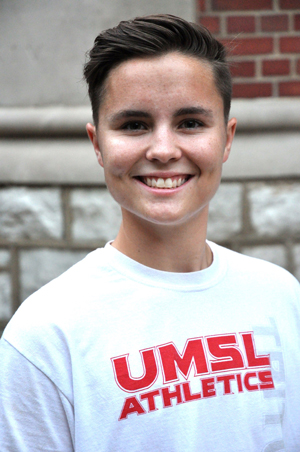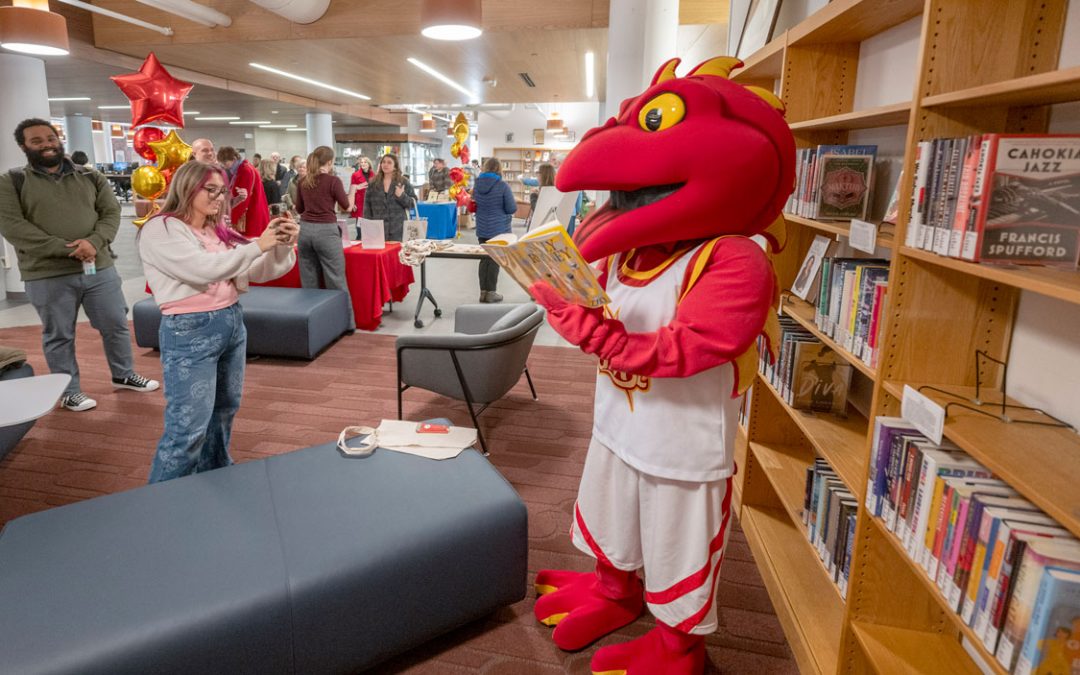University of Missouri–St. Louis sophomore Ryan Logan didn’t know what to expect when coming out as a male to Brian Levin, his softball coach.
“While my team was aware that I was transgender, I was not yet out to my coach and the athletic department as a whole,” says Logan, “I remember being extremely nervous, but after talking with Brian, I quickly realized that I had nothing to be nervous about. The most important thing that my coach gave me was his respect. He told me that while he didn’t know a lot about the experiences of transgender people, he was going to try his best to make sure I felt accepted.”

UMSL softball infielder Ryan Logan will lead a roundtable discussion titled “Putting the ‘Men’ in Women’s Softball” at the second annual Transgender Spectrum Conference. (Photo by Madison Zbaraschuk).
Recognized for his candor, insight and positive attitude, Logan, a business administration major and student in the Pierre Laclede Honors College, has been chosen as a panelist for the second annual Transgender Spectrum Conference. The award-winning conference is the product of collaboration between the UMSL College of Education, UMSL Gender Studies program and several local and national LGBT rights organizations. Logan will lead a roundtable discussion titled “Putting the ‘Men’ in Women’s Softball.” UMSL Daily recently caught up with Logan to learn more about his experiences and upcoming discussion.
What are some effective measures UMSL has taken to become more inclusive?
One important measure that UMSL has taken to become more inclusive and safe is the growing installment of gender-neutral bathrooms and changing areas. There is a gender-neutral bathroom in the student center, and a gender-neutral changing area was included in the plans for the new recreation center. Having these gender-neutral spaces takes a lot of stress out of transgender people’s lives, especially if they have not fully transitioned physically. Another effective measure that UMSL has taken is the option to have your preferred name displayed on your student ID and mygateway systems. The cost of a legal name change is very high, and some transgender people live with a preferred name for years before getting it legally changed. UMSL’s preferred name option takes away one more hurdle in a transgender student’s daily life. This way, a student doesn’t need to come out to every student and professor in their class if they don’t want to.
Could you explain the proper usage of pronouns for transgender persons and why it is important to respect pronoun preference?
The proper usage of pronouns seems like a given to cisgender people. Before coming to the realization that I was transgender, I never gave pronouns a second thought. For transgender people, the proper usage of pronouns refers to using the pronouns that match with the gender they identify with. For example, if someone identifies as male, then the proper pronouns to use would be he, him and his. Respecting these pronouns is very important to transgender people because it validates their gender identity.
Why is the Transgender Spectrum Conference important, and what is your role in its production?
The Transgender Spectrum Conference is important because it is an opportunity to educate cisgender people on how to become good allies. A very important aspect of the Transgender Spectrum Conference is that it offers a safe place for struggling people to receive support, advice and information that they can apply to their lives. For the Transgender Spectrum Conference, I am leading a roundtable discussion about transgender people in athletics. I hope to make people aware of the struggles that trans-athletes experience as well as discuss ways to improve the athletic community.
What’s the No. 1 thing you’d like society to know about the experiences of transgender persons?
One thing I would like society to know is that transgender people overcome countless obstacles just to live a “normal” life. Transgender people have to work for things that cisgender people view as rights such as a gender appropriate names, proper pronouns usage and comfort in using public bathrooms. I would like society to know that transgender people are just looking to feel at peace with their bodies.















